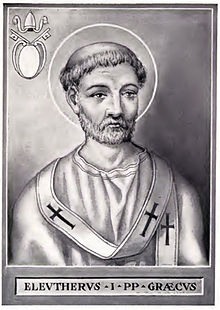Pope Eleuterus
|
Pope Saint Eleuterus |
|
|---|---|
 |
|
| Papacy began | c. 174 |
| Papacy ended | 189 |
| Predecessor | Soter |
| Successor | Victor I |
| Personal details | |
| Birth name | Eleuterus or Eleutherius |
| Born | Nicopolis, Epirus |
| Died | 189 Rome, Roman Empire |
| Sainthood | |
| Feast day | 26 May |
Pope Eleuterus (died 189), also known as Eleutherius, was the Bishop of Rome from c. 174 to his death. (The Vatican cites 171 or 177 to 185 or 193.) According to the Liber Pontificalis, he was an Illyrian born in Nicopolis in Epirus. His contemporary Hegesippus wrote that he was a deacon of the Roman Church under Pope Anicetus (c. 154–164), and remained so under Pope Soter, whom he succeeded around 174.
The 6th-century recension of Liber Pontificalis ('Book of the Popes') known as the "Felician Catalog" includes additional commentary to the work's earlier entry on Eleuterus. One addition ascribes to Eleutherius the reïssuance of a decree: "And he again affirmed that no food should be repudiated by Christians strong in their faith, as God created it, [provided] however that it is sensible and edible." Such a decree might have been issued against early continuations of Jewish dietary law and against similar laws practiced by the Gnostics and Montanists. It is also possible, however, that the editor of the passage attributed to Eleuterus a decree similar to another issued around the year 500 in order to give it greater authority.
Another addition credited Eleuterus with receiving a letter from "Lucius, King of Britain" or "King of the Britons", declaring an intention to convert to Christianity. No earlier accounts of this mission have been found. It is now generally considered to be a pious forgery, although there remains disagreement over its original purpose. Haddan, Stubbs, and Wilkins considered the passage "manifestly written in the time and tone" of St Prosper, secretary to Pope Leo the Great in the mid-5th century, and supportive of the missions of St Germanus and St Palladius.Duchesne dated the entry a little later to the pontificate of Boniface II around 530, and Mommsen to the early 7th century. Only the last would support the conjecture that it aimed to support the Gregorian mission to the Anglo-Saxons led by St Augustine, who encountered great difficulty with the native British Christians, as at the Synod of Chester. Indeed, the Celtic Christians invoked the antiquity of their church to generally avoid submission to Canterbury until the Norman conquest, but it is noteworthy that no arguments invoking the mission to Lucius appear to have been made by either side during the synods among the Welsh and Saxon bishops.
...
Wikipedia
